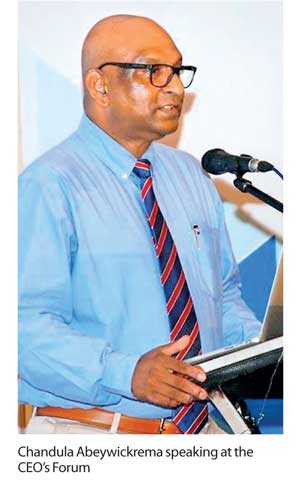08 Sep 2016 - {{hitsCtrl.values.hits}}
Chairman of CSR Sri Lanka and Consultant for Strategy & Marketing at National Savings Bank (NSB) Chandula Abeywickrema was invited to speak at the CEO’s Forum organized by McQuire Rens Group and Art Television which was held at the Kingsbury Hotel recently. 
The veteran banker spoke on the topic on ‘Business Sustainability through Social and Environmental Transformation.’ Starting his speech he pointed out that the academic form of free education has created desire for exclusivity- white collar jobs where else technical, vocational, and skills based education is marginalized- no aspiration to skills based employment career so there is a huge gap between employment opportunities and employability.
“I have witnessed a gradual increase in the number of youth underemployment which is more than 30 percent at the moment. In my lifetime I witnessed three youth uprisings, including the 30 year old war. We have to take necessary steps to avoid another repeat of these event by empowering the youth, which would secure the future of the country. Around 500,000 students sit for O/L’s and A/L’s and then only 25,000 enter the university system. So we need to have a solution for the rest as well,” he added.
According to Abeywickrema the best solution to the curb this problem is by promoting youth entrepreneurship which is the power to employability and youth empowerment. Creation of incubators across the country to blossom youth entrepreneurship, building a network of local impact investors, creating fertile ground to nurture social entrepreneurs and the stakeholders can facilitate a ‘Sri Lankan Silicon Valley’ for match making between youth entrepreneurs and impact investors will help this cause.
“Public and Private sector Partnerships (PPP’s) will make the people sector economically enriched for business sustainability. All the stake holders need to see the big picture and see eye to eye. Does the private sector labeled the engine of growth; have enough pulling power for economic inclusivity? It is through the strong public and private sector institutional framework that lay good foundation for inclusive economic growth and poverty reduction,” he pointed out.
He said that responsible global entrepreneurs take accountability for sharing the economic benefits to enrich the societies in which they live. “The sustainable businesses depend on the success of the transfer of economic benefits to transform societies where the businesses thrive in. Great entrepreneurs like Warren Buffett and Bill Gates have learned the science of wealth creation and now mastering the art of wealth distribution, of the wealth they have accumulated,” he added.
The veteran banker proposed to the audience that by developing economic capabilities of all segments will lead to the creation of a dynamic economic ecosystem for greater business sustainability. He said that this can be done by the diversity of players in different shapes and sizes of businesses that facilitate demand driven products and service availability, accessibility and affordability, creating an economic eco system that educate, protect and empower all the segments of the country.
Abeywickrema concluded by challenging the CEOs and the corporate leaders to strategically move ahead by going beyond the concept triple bottom line of ‘PEOPLE, PLANET and PROFIT,’ to quadruple the bottom line by responsible profit generation and ensure the PROFIT be designated towards progress of the PEOPLE which include all stake holders and the PLANET for business sustainability.
10 Jan 2025 1 hours ago
10 Jan 2025 1 hours ago
10 Jan 2025 2 hours ago
10 Jan 2025 3 hours ago
10 Jan 2025 3 hours ago